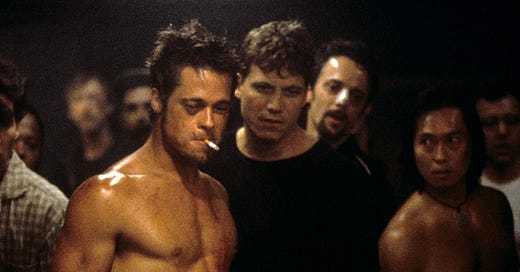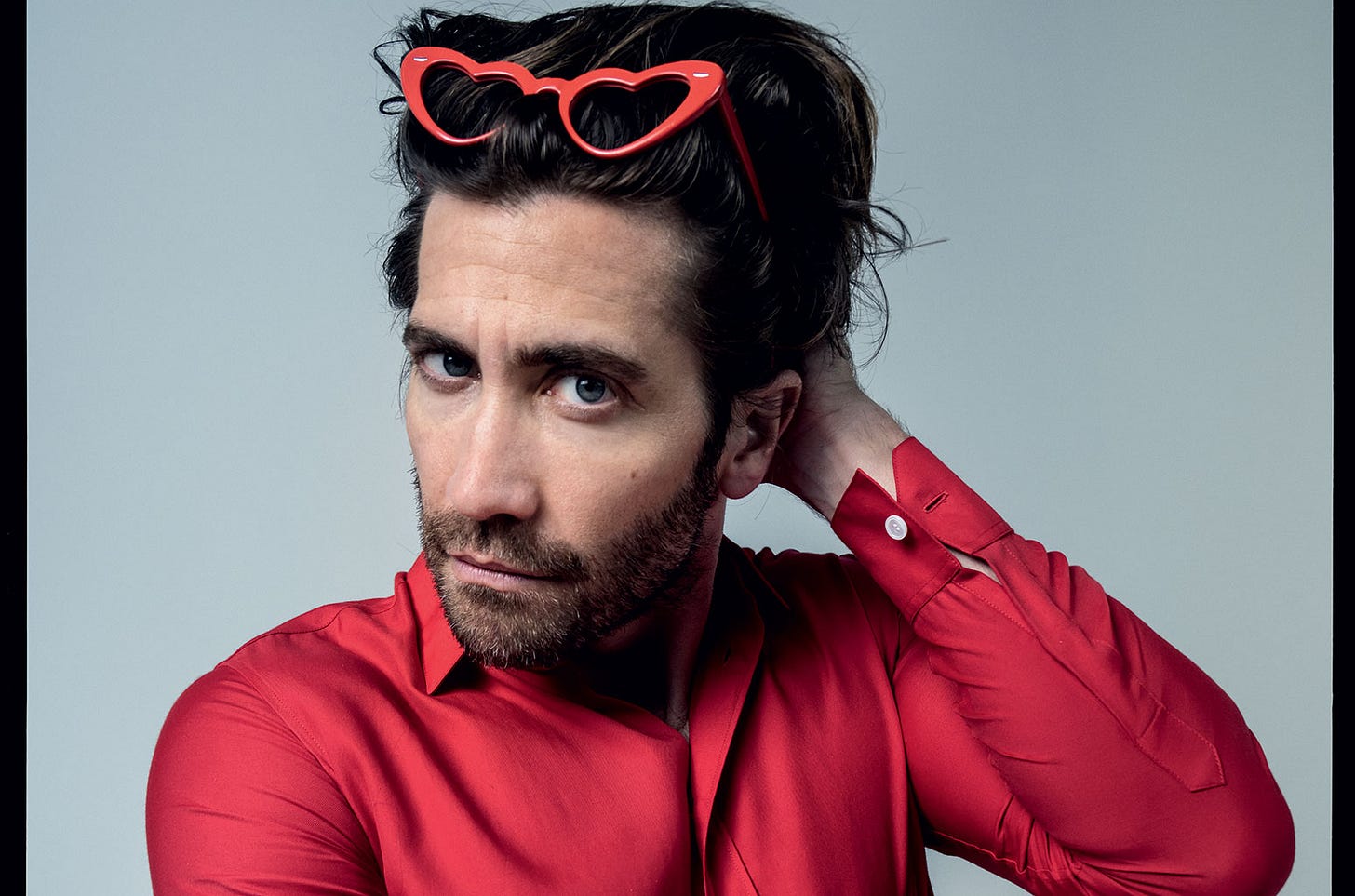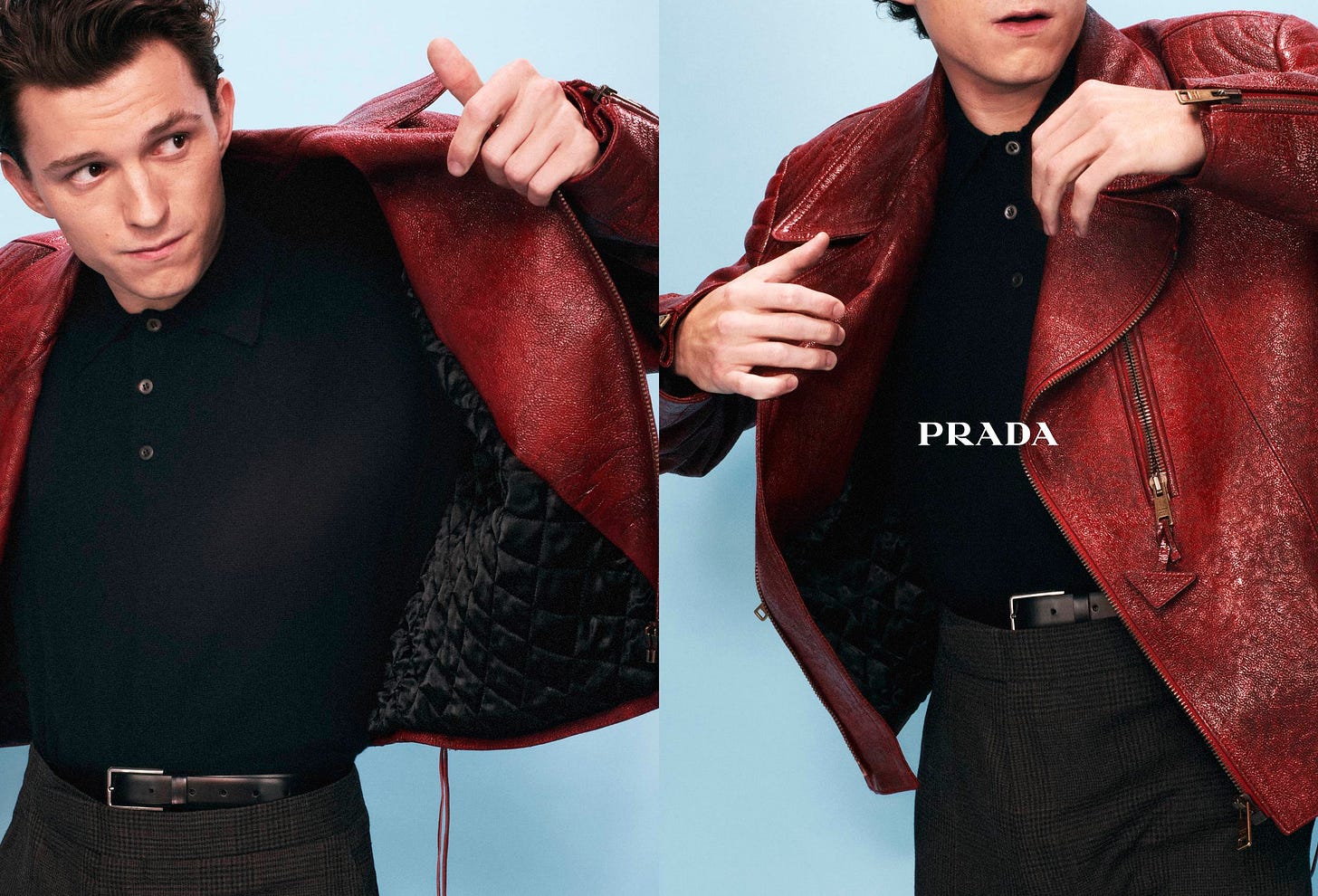This issue marks the one year anniversary of Bloopers and Breadcrumbs! Early readers will recall that I started this newsletter in the hopes of writing more, and I’m happy to say that I’ve probably written more this past year than I have in my entire life. I can’t promise that it’s all been good, but it has certainly been rewarding for me, and I hope at least mildly entertaining for you.
If you’re reading this newsletter, thank you for being one of the people who relentlessly encourages my creativity and enthusiasm. It brings me more joy than you know.
The “Bro Film” Breakdown
I haven’t been on that many first dates in my life, but my friend and I have a long-running joke about films that have the power to stop any romantic evening in its tracks:
“What if he said his favorite film was Fight Club?”
“Or American Psycho???”
The answer is usually some variation on “run”, but the whole joke is shorthand for a much broader, much thornier conversation about “bro films” and the people who watch and love them. The “bro film” is a moniker that’s come across my radar more and more in recent years, and it’s been codified and immortalized in Letterboxd lists like “the filmbro watchlist” or “red flag for men white flag for women”.
For a term that’s becoming increasingly popular, it’s rather nebulously defined. The movies labeled as film bro favorites don’t always seem connected, and like any vague cultural terminology, it’s debated what counts or doesn’t count, what has the “vibe” or lacks it. That kind of enigma, while occasionally fun to debate, is not helpful when trying to understand what the bro film designation actually tells us, so I’ve found myself pushing more and more toward specificity.
I define a bro film as a film that’s making a statement about societal ills - especially toxic masculinity - that is often misunderstood as a promoter of the very ills it was trying to critique in the first place. It’s a narrow definition and a convoluted one, but that complexity is because a bro film is necessarily defined by the relationship between film and audience— which is to say, by its interpretation. A film cannot be a bro film independently; it can only be transformed into one by its fanbase. This means that there cannot be a bro film without its equal and opposite viewership: the film bro.
The classic film bro is infamous. This is the person who watches Fight Club and wants to start a Fight Club of their own. Someone who thinks that Travis Bickle is merely misunderstood. Someone who finishes Ex Machina and thinks Ava is evil, and also a bitch. This is the person who cannot differentiate between art and endorsement. They are so unaware of a film’s ability to distance itself from its content through critique or satire that they simply take what’s given at face value.
This film bro is notorious, but maybe also a dying breed. Perhaps I’m living inside an insular cultural bubble (it’s a probable possibility), but I’m not meeting people who think this way. Instead, I see ridicule of the concept of the film bro far more than I see any actual film bros in the wild.
The conversation around how film bros misunderstand the films they love is so prevalent that it’s pushed the original film bro to near-extinction. But with the threat of extinction comes evolution, and this is no exception. The second, new-and-improved version of the film bro is rooted in something much subtler than its predecessor was.
Film bro v2.0 is self-aware. This person understands the conversation around them and wouldn’t be caught dead misinterpreting the films they idolize. What’s insidious about this new film bro is the paradoxical complacency baked into their self-awareness. It’s as though if a person professes their knowledge that a film is a critique and a protagonist is an anti-hero, then they’re absolved of enjoying the content.
To me, that magic absolution is dangerous, because these films are deliberately charismatic, working hard to seduce you into the anti-hero’s world, making the difficult-to-watch impossible not to. One of the most potent examples of this is Fight Club’s Tyler Durden, who mutilates people and commits acts of terrorism casually. It’s impossible to forget, though, that Tyler Durden is played by Brad Pitt, and much of Fight Club is purposefully spent under the seductive sway of his sheer charisma, the raw coolness of him, and his confident masculinity. It’s a primal, stupid instinct, but we let attraction cover a lot of sins, and movies know how to use that truth to their advantage. Films like Fight Club work because they bring the viewer into the fold and force us to saturate ourselves in the very world we’re meant to be critiquing.
I don’t fit the stereotypical film bro demographic (not adolescent, not white, not male), but I’m not immune to this— and if these movies are doing their jobs well, no one is. The question is really how we react to the act of being seduced by these films. Do we enjoy these films because they force an uncomfortable reconciliation between what we find charismatic and what we know deserves criticism? Or do we enjoy them because we like, narcissistically, to look at the ugliest parts of ourselves by gussying them up as charismatic? Maybe it sounds like a nuance, but the latter version of this is rooted in self-deception— we seek connection under the guise of critique while never truly considering change.
One of my favorite moments in Bojack Horseman gets at this very point. In a speech promoting his new show Philbert - a gritty TV show about an anti-hero detective who’s an alcoholic and haunted by his past - Bojack makes it clear that connecting to Philbert is an exoneration.
Philbert is a critique, yes, (“we’re all terrible”), but connection absolves us of that critique (“so therefore we’re all okay”), which ironically makes Philbert justification for the behaviors the critique sought to change in the first place. The follow-up to this speech, in which Diane, Philbert’s writer and Bojack’s friend, confronts Bojack about his interpretation, is even more damning.
You know, that’s not the point of Philbert, for guys to watch it and feel okay. I don’t want you, or anyone else, justifying their shitty behavior because of this show.
What is your problem? Why can’t you accept that something you did is successful? It’s connecting to people, and that’s good.
This is what’s at the heart of film bro culture. It’s enjoying without bothering to ask what’s creating that enjoyment, championing the controversial in the name of honesty but at the cost of conversation, and indulging in the conviction that so long as a film is connecting with its audience, it does not matter how the connection is made. The world of the film bro is one of cognitive dissonance, where critique is warped into something far more convenient: an excuse for the continuation of the status quo, which never asks for self-reflection or requires growth.
This isn’t about gatekeeping certain films or ensuring everyone interprets movies “correctly”— I don’t believe in one right interpretation (although I certainly believe in wrong ones). Instead, understanding the film bro mindset reminds me that like most things in life, what matters is not the binary yes/no, like/dislike, good/bad, but rather the nuanced explanation behind that binary, which is where everything interesting always lies. In that spirit, if I ever go on a first date where the person opposite me claims Patrick Bateman as their favorite character, before I start stuffing breadsticks into my purse, I’ll at least pause to ask that age-old, ever-important question: why?
Culture Crumbs
Jake Gyllenhaal is unfortunately doing the most in a recent W photoshoot, making Swifties everywhere see red
Lady Gaga, recent star of House of Gucci, suggested that in addition to sending hit men to assassinate her husband, Patrizia Reggiani sent “large swarms of flies” to Gaga’s Italian balcony
No Zendaya update this week, but her boyfriend Tom Holland does have a new campaign with Prada
In light of the new Macbeth adaptation, I’m resurfacing one of my all-time favorite videos (start at 35 min and watch for the next 10), in which two actors do a scene from Macbeth two different ways
Finally, I’m sorry to bring up Jake Gyllenhaal twice in one issue, but he’s teamed up with director Guy Ritchie for a new action flick. No further comments.
That’s all for this issue! Thank you for reading, and please consider subscribing if you enjoy this content (it’s free)!









